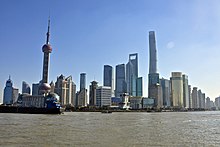Shanghai
provincial-level municipality in China
Shanghai is the largest Chinese city by population and the largest city proper by population in the world. It is one of the four direct-controlled municipalities of the People's Republic of China, with a population of more than 24 million as of 2014. It is a global financial center, and a transport hub with the world's busiest container port. Located in the Yangtze River Delta in East China, Shanghai sits on the south edge of the mouth of the Yangtze in the middle portion of the Chinese coast. The municipality borders the provinces of Jiangsu and Zhejiang to the north, south and west, and is bounded to the east by the East China Sea.

| This geography-related article is a stub. You can help out with Wikiquote by expanding it! |
Quotes
edit- Bizarre advertising displays—the honour guard of fifty Chinese hunchbacks outside the film premiere of The Hunchback of Notre Dame sticks in my mind—were part of the everyday reality of the city, although I sometimes wonder if everyday reality was the one element missing from the city.
- J.G. Ballard, recalling his childhood in 1930s Old Shanghai, Miracles of Life: Shanghai to Shepperton, An Autobiography 2008 p. 4
- With its newspapers and radio stations in every language, Shanghai was a media city before its time, celebrated as the 'Paris of the Orient' and the wickedest city in the world ... Unlimited venture capitalism rode in style down streets lined with beggars showing their sores and wounds ... Every day the trucks of the Shanghai Municipal Council roamed the streets collecting the thousands of bodies of destitute Chinese who had starved to death on Shanghai's pavements, the hardest in the world.
- Ballard, p. 5
- I would see something strange and mysterious, and treat it as normal ... Shanghai struck me as a magical place, a self-generating fantasy that left the real world far behind. There was always something odd and incongruous to see ... Anything was possible, and everything could be bought and sold. In many ways it seems like a stage set, but at the time it was real, and I think a large part of my fiction has been an attempt to evoke it by means other than memory.
- Ballard, p. 6
- While collective memory is usually grounded in fact, it need not be. If you go to China, you will more than likely be told the story of the park in the foreign concession area of Shanghai that had on its gate a sign that read “Dogs and Chinese Not Admitted.” While it is true that the park was reserved for foreigners, insulting enough in itself, the real insult for most Chinese was their pairing with dogs. The only trouble is that there is no evidence the sign ever existed. When young Chinese historians expressed some doubts about the story in 1994, the official press reacted with anger. “Some people,” a well-known journalist wrote, “do not understand the humiliations of old Chinas history or else they harbour sceptical attitudes and even go so far as to write off serious historical humiliation lightly; this is very dangerous.” It can be dangerous to question the stories people tell about themselves because so much of our identity is both shaped by and bound up with our past history. That is why dealing with the past, in deciding on which version we want, or on what we want to remember and to forget, can become so politically charged.
- Margaret MacMillan, The Uses and Abuses of History (2008), pp. 52-53
- China as a society, a government, an economy and a culture is quite difficult for us to comprehend today. The changes are so rapid in cities like Beijing and Shanghai and the culture remarkably fluid... China is increasingly influential in the world and more and more people have hopes that China will be a leader... China has ended up playing a critical role in geopolitics more quickly than anybody had anticipated.
- Emanuel Pastreich, "Chinese meritocracy and the limits of democracy" (17 December 2015), The Diplomat
- This city is a completely female city. Female town. Beijing is male. All rough and politics. Shanghai is more delicate. Money talks. Beautiful. I had enough rough. I need details. Specially because (I am) a lady. I need city.
- Jin Xing cited in: SanSan Kwan, Kinesthetic City: Dance and Movement in Chinese Urban Spaces, 2013 p. xxx